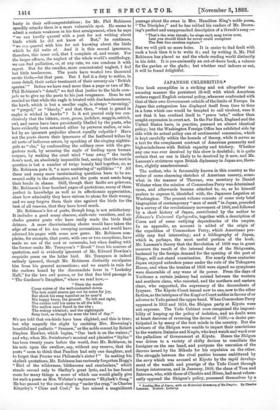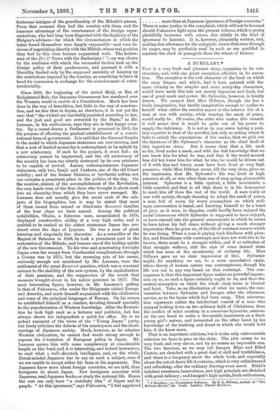JAPANESE CELEBRITLES.* Tins book exemplifies in a striking and not
altogether nu- amusing manner the persistent ill-will with which American writers regard English external policy, wherever confronted with that of their own Government outside of the limits of Europe. In Japan this antagonism has displayed itself from time to time in a form which one would be tempted to call virulent, were it not that it has confined itself to " prave 'orts," rather than sought expression in overt act. In the Far East, England and the United States have, in practice, pursued an almost identical policy; but the Washington Foreign Office has exhibited side by side with its actual policy one of sentimental concession, which is kept carefully within the bounds of theory, while it serves as a text for the complacent contrast of American generosity and highmindedness with British rapacity and trickery. Whether any one was ever deceived by this show is doubtful ; it is quite certain that no one is likely to be deceived by it now, and Mr. Lanman's strictures upon British diplomacy in Japan are, there- fore, slightly anachronismal.
The author, who is favourably known in this country as the writer of some charming sketches of American scenery, some- what in the manner of Thoreau, was secretary to Daniel Webster when the mission of Commodore Perry was determined upon, and afterwards became attached to, or, as he himself prefers to express it, identified with, the Japanese Legation at Washington. The present volume consists of some sixty brief biographies of contemporary "men of mark " in Japan, preceded by a survey of the revolutionary movement of 1868, and followed by a short history of Japan, contributed by the author to Johnson's Universal Cyclopcedia, together with a description of Corea and of some outlying dependencies of the empire. In an appendix, an account is added of the origin of the expedition of Commodore Perry, which Americans pos- sibly may find interesting ; and a bibliography of Japan, which is, perhaps, the most useful portion of the book. Mr. Lanman's theory that the Revolution of 1868 was in great measure the result of the internal decay of the ShOgunate, hastened by the foreign demand for the opening of the port of Hiogo, will not stand examination. For nearly three centuries Japan enjoyed unbroken peace under the rule of the Tokugawa House, and when the treaties of 1858 were signed no symptoms were discernible of any wane of its power. From the days of Yoritomo a certain jealousy had existed between the western and southern clans, who resented, and the northern and eastern clans, who supported, the supremacy of the descendants of lyeyasn. The Kiyoto Court leaned now to one, now to the other faction, as the intrigues of the Kug6 or Court nobles in favour of or adverse to Yedo gained the upper hand. When Commodore Perry appeared in 1853 and 1854, the Shogun party at Kiyoto were not supreme. The Yedo Cabinet soon recognised the impossi- bility of keeping up the policy of isolation, and no doubt were at heart desirous of reversing the decree of 1639,—a desire par- ticipated in by many of the best minds in the country. But the advisers of the Shogun were unable to impart their convictions to the western Daimios and Kuges, who kept watch and ward over the palladium of Government at Kiyoto. Hence the Shogun was driven to a variety of shifty devices to conciliate the foreigner on the one hand, and postpone the execution of the decrees issued by the Mikado for his expulsion on the other. The struggle between the rival parties became embittered by the envy which was aroused at Kiyoto by the rapid develop- ment of the wealth and prestige of the Yedo Court through foreign intercourse, and in January, 1868, the clans of Tosa and Satsuma, who, with those of Choshiu and Hizen, had most vehem- ently opposed the ShOgrm's policy, possessed themselves by a
• Leading Men of Japan, with an Historical Summary of the Empire. By Charles Lanman. Boston: Lothrop.
dexterous intrigue of the guardianship of the Mikado's person. From that moment they had the country with them, and the immense advantage of the countenance of the foreign repre- sentatives, who had long been disgusted with the duplicity of the ShOgun's advisers—for which the circumstances in which the latter found themselves were largely responsible—and were de- sirous of negotiating directly with the Mikado, whose real position they had by this time become acquainted with. The hollow-
ness of the (" Down with the Barbarians ") cry was shown by the readiness with which the successful faction took up the foreign policy of their predecessors, and pursued it with a liberality limited only by the supposed necessity of keeping up the restrictions imposed by the treaties, as something to have in hand for concession in exchange for the abandonment of extra- territoriality.
Since 1868, the beginning of the period Meiji, or Era of Enlightened Rule, the Japanese Government has wandered over the Western world in search of a Constitution. Much has been done in the way of demolition, but little in the way of construc- tion, and we fear that in Japan, as elsewhere, it is not yet the case that " the wicked are inevitably punished according to law, and the just and good are rewarded by the State," as Mr. Lanman, in his enthusiasm, says they are in that happy coun- try. By a recent decree a Parliament is promised in 1891, for the purpose of effecting the gradual establishment of a consti- tutional form of government. It is said that the German Empire is the model to which Japanese statesmen are now turning, and that a sort of limited monarchy is contemplated, to be upheld by a new aristocracy. If such be the project, it must fail ; an aristocracy cannot be improvised, and the old aristocracy of the country has been too utterly destroyed by its own retainers to be capable of revival. Among contemporaneous Japanese statesmen, only two, Sanjo and Iwakura, are of the old Court nobility ; and of the former Daimios, or territorial nobles, not one occupies a prominent place in the politics of the day. On the morrow, almost, of the accomplishment of the Revolution, the very heads even of the four clans who brought it about sank into an obscurity from which they have never emerged. Mr. Lanman does not usually give the social rank of the sub- jects of his biographies, but it may be stated that most of them issued from second or third-rate Samurai families of the four clans we have named. Among the political notabilities, Okubo, a Satsuma man, assassinated in 1878, displayed constructive ability of a very high order, and is entitled to be ranked as the ablest statesman Japan has pro- duced since the days of Iyeyasu. He was a man of great learning and singularly fine character. As a councillor of the Regent of Satsuma in 1868, he took a prominent part in the restoration of the Mikado, and became one of the leading spirits of the new Government. To his wise and penetrating foresight Japan owes her escape from Continental complications through a Corean war in 1873, but the crowning acts of his career, curiously enough not mentioned by Mr. Lanman, were the settlement of the great Samurai question, which was a constant menace to the stability of the new system, by the capitalisation of their pensions, and the suppression of the revolt that measure brought about in his native province in 1877. The most interesting figure, however, in Mr. Lanman's gallery is that of Fukuzawa, who under the Shogunate visited Europe and America, and made himself acquainted with the civilisation and some of the principal languages of Europe. On his return he established himself as a teacher, devoting himself specially to the popularisation of Western knowledge. After the Restora- tion he took high rank as a lecturer and publicist, but has always shown too independent a spirit for office. He is an ardent exponent of the views of the " Young Japan " party, but freely criticises the defects of his countrymen and the short- comings of Japanese society. Much, however, as he admires Western civilisation, he cannot find words strong enough to express his detestation of European policy in Japan. Mr. Lanman quotes him with some complacency at considerable length on this head, and it is interesting, and indeed instructive, to read what a well-educated, intelligent, and, on the whole, liberal-minded Japanese has to say on such a subject, even if we are unable to accept either his facts or his arguments. The Japanese know more about foreign countries, we are told, than foreigners do about Japan. Few foreigners associate with Japanese, read Japanese books, or study the national life. Hence the rest can only have " a crotchety idea " of Japan and its people. "At this ignorance," says Fukuzawa, "I feel aggrieved
more than at Japanese ignorance of foreign countries."
There is some justice in the complaint, which will not be lessened should Fukuzawa light upon the present volume, which is pretty plentifully bestrewn with errors, due chiefly to the kind of ignorance he laments. It is, however, pleasantly written, and, making due allowance for the eulogistic strain that runs through its pages, may bo profitably read by such as are qualified to separate the chaff of panegyric from the wheat of history.







































 Previous page
Previous page